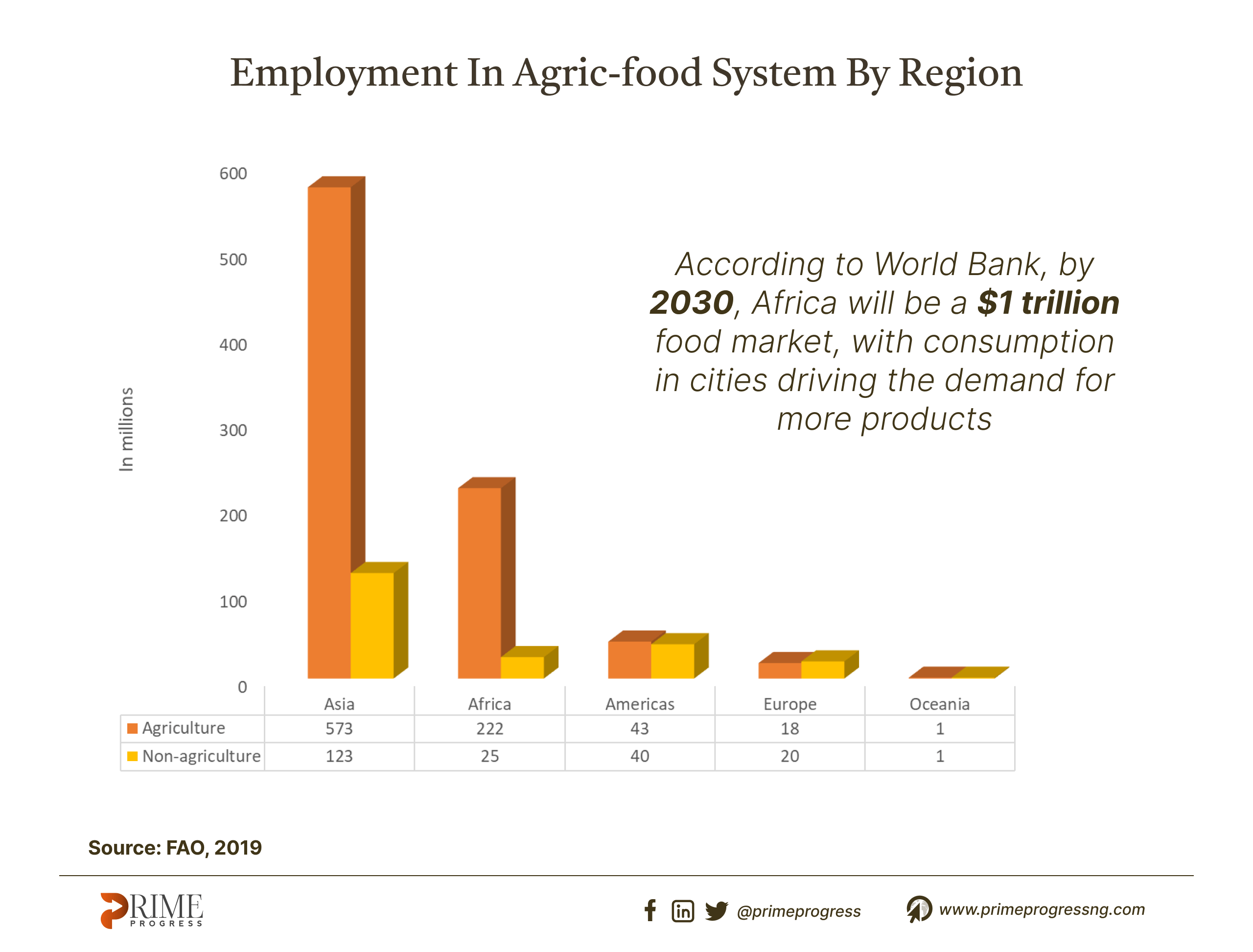Africa is leveraging its vast small-scale farming community to grow its agrifood sector, providing additional jobs for a ballooning population expected to double by 2050.
According to a recent Food and Agriculture Organization (FAO) study, some 290 million Africans are employed in food and agriculture, a number second “only second to Asia, where some 790 million people are employed in agrifood systems,” the report said.
The report, ‘Estimating Global and Country Level Employment in Agrifood Systems, notes that the high number of jobs created in Africa reflects the efforts made by different countries to invest in and empower farmers.
“There are policy and practical agendas on the national and global level that are addressing the challenges facing agrifood systems in an integrated way,” noted Ben Davis, director of FAO’s Inclusive Rural Transformation and Gender Equality Division,
While food insecurity is still a challenge in many African countries, the report shows that agrifood systems drive economic growth beyond feeding populations.
A 2022 World Bank report showed the African agricultural economy is the fastest growing across all continents, witnessing a 4.1% growth from 2000-2020 compared to 2.7% worldwide.
By 2030, Africa will be a $1 trillion food market, with consumption in cities driving the demand for more products, according to the report.
Many initiatives and programs are being advanced in African countries to unlock more job opportunities to empower low to medium-level farmers.
African countries are keen to unlock more jobs, from farm input subsidy programmes to the development of fertiliser factories to farm digitalisation programmes.
For example, Kenya distributes 388,000 metric tonnes of subsidised fertiliser to farmers in 24 of the country’s 47 counties.
By focusing on maise-growing regions, the program aims to reduce farmer expenses and provide fertilisers after food supply disruption due to the Russia-Ukraine conflict.
Kello Harsama, Kenya’s permanent secretary at the Ministry of Agriculture, recently told journalists that the initiative “will be continuous and data-led…and will cut fertiliser costs by half.”
In Zambia, a $300 million programme funded by the World Bank was launched in February 2023 to promote agricultural diversification, sustainability and sector jobs.
Zambia’s Growth Opportunities Programmes for Results aims to grow agricultural exports from $756 million in 2021 to over $1 billion by 2026.
Thanks to a strategic MOU signed with UAE royal family member Sheikh Ahmed Dalmook Al Maktoum, Tanzania’s agricultural sector is also set to get a boost. The Gulf business will supply high-quality fertilisers to Tanzania, boosting crop yields and economic growth.
The deal included an agreement to establish a state-of-the-art fertiliser storage facility in Tanzania to boost shelf life.
In February, Tanzania and Morocco also announced plans to establish a fertiliser factory in the coastal town of Kisarawe.
Morocco’s OCP will work with the Tanzania Fertiliser Company in the project that would lower importation costs, with Tanzania currently importing more than 70% of its fertiliser needs.
All these initiatives are vital in opening up more economic growth opportunities besides bridging existing gaps.
According to Simon Nyota, a Nairobi-based IT business expert, these initiatives are critical since they target smallholder farmers.
“This is significant since smallholder farmers are the backbone of agricultural production. They manage more than 80% of farmland in many countries,” he explained.
However, some government plans strategically target youth through digitalising agricultural systems.
In Uganda, for instance, the government is giving a tech upgrade to its farmers, and the programme seeks to encourage youth participation in farming.
This is consistent with the country’s vision for 2040, a strategic plan that relies on digitalising critical systems. The initiative will facilitate information sharing between farmers and government experts.
Uganda’s National Planning Authority delved into the farming needs of over 650,000 individuals and studied more than 370 farmer-producer organisations, mainly focusing on the youth. The study found that 250,000 of those individuals were young farmers.
A 2023 World Bank report shows Africa’s working-age population is expected to grow by 450 million people, close to 70%, by 2035.
Although the report predicts a modest 100 million new jobs for the rapidly growing workforce, African countries are now recognising the potential of agrifood systems to unlock even more opportunities.
bird story agency
Africa is utilizing its extensive small-scale farming community to drive growth in its agrifood sector and create jobs for its rapidly increasing population, which is expected to double by 2050. According to a Food and Agriculture Organization (FAO) study, 290 million Africans are employed in food and agriculture, showing significant investment and empowerment efforts in the sector.
The 2022 World Bank report highlighted that Africa's agricultural economy is the fastest-growing, with a 4.1% growth from 2000-2020. By 2030, Africa is predicted to become a $1 trillion food market driven by urban consumption.
Various initiatives in African countries aim to create more jobs and support small to medium-level farmers. For instance, Kenya provides subsidized fertilizer to reduce expenses, while Zambia introduced a $300 million program to boost agricultural exports. Tanzania, with partnerships from UAE and Morocco, is set to construct facilities and factories to improve fertilizer supply and shelf life.
Further efforts include targeting youth by digitalizing agriculture systems, such as Uganda's initiative to encourage youth participation in farming, aligning with the country's vision for 2040.
Africa's working-age population is expected to grow by 450 million by 2035, presenting opportunities for job creation within agrifood systems, as recognized by African governments.






